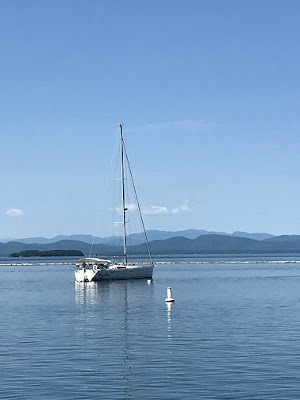 |
| Burlington harbor |
I've said this before, and I'll say it again: One of the privileges of being a physician is that you get to live in a state of perpetual awe. It starts with the first pass of the scalpel on your first day in the anatomy lab. It continues as you tease out every organ, blood vessel, and nerve in the body you've been assigned to dissect. A sense of wonder punches you in the gut the first time you hear a beating human heart, and realize your own heart has been pumping steadily and predictably without any effort on your part since before the day you were born.
"There is more wisdom in your body
than in your deepest philosophy."
~Friedrich Nietzsche~
You'd have to believe in miracles if you understood the way a broken bone heals, what it takes for an open wound to close, how a lifeless heart can pick up the beat again.
Don't even ask what happens during sex.
I started medical school in 1970, and I studied traditional Western medicine for seven years. That meant memorizing the structure and function of all eleven organ systems, and the symptoms and signs of the diseases that affect them. I learned how to examine a patient with those symptoms, which diagnostic tests to run, how to interpret them, and finally, how to treat the patient.
It turns out, that was the easy part. Most of it made sense. Understanding how oxygen gets into the bloodstream. How the kidneys know what to excrete and what to conserve. How food is broken down and absorbed, and what we are left to deal with. In the healthy state, every process is carried out with precision, with perfect timing, and uncanny coordination. And, for the most part, it all takes place without any effort, attention, or awareness on our part...
...which is jaw-dropping enough, except that it leaves out the greatest mystery of all: the origin, nature, and function of consciousness, including thought, memory, and imagination. Science has fully explored the anatomy, molecular structure, electrophysiology and biochemistry of the brain, but we haven't quite figured out how it works. We don't know how a thought is generated in the first place, and how it is translated into something as easily experienced and observed as tears, or laughter, or fear. How a thought can raise the heart rate, or make us sweat, or leave us shaking. How a distant memory resurfaces, and where it has been hiding.
Physicists, biologists, physicians, philosophers, and quantum theorists are hard at work trying to figure out what exactly it is that makes us who we are...while our bodies are mysteriously, silently, and predictably doing what they do best: making us who we are.
I practiced medicine for over thirty years without giving either the body or the mind credit for its genius. I wonder what else I missed. What I should have known that I didn't, and how it might have helped my patients, and myself.
It turns out, that was the easy part. Most of it made sense. Understanding how oxygen gets into the bloodstream. How the kidneys know what to excrete and what to conserve. How food is broken down and absorbed, and what we are left to deal with. In the healthy state, every process is carried out with precision, with perfect timing, and uncanny coordination. And, for the most part, it all takes place without any effort, attention, or awareness on our part...
...which is jaw-dropping enough, except that it leaves out the greatest mystery of all: the origin, nature, and function of consciousness, including thought, memory, and imagination. Science has fully explored the anatomy, molecular structure, electrophysiology and biochemistry of the brain, but we haven't quite figured out how it works. We don't know how a thought is generated in the first place, and how it is translated into something as easily experienced and observed as tears, or laughter, or fear. How a thought can raise the heart rate, or make us sweat, or leave us shaking. How a distant memory resurfaces, and where it has been hiding.
"Your body hears everything
your mind says."
~Naomi Judd~
The fact that the body knows what to do to keep itself healthy is incomprehensible. The fact that it knows how to heal itself is beyond imagination.
"Imagination is more important
than knowledge."
~Albert Einstein~
Physicists, biologists, physicians, philosophers, and quantum theorists are hard at work trying to figure out what exactly it is that makes us who we are...while our bodies are mysteriously, silently, and predictably doing what they do best: making us who we are.
I practiced medicine for over thirty years without giving either the body or the mind credit for its genius. I wonder what else I missed. What I should have known that I didn't, and how it might have helped my patients, and myself.
"Your body's ability to heal
is greater than anyone
has permitted you to believe."
~author unknown but often quoted~
jan


